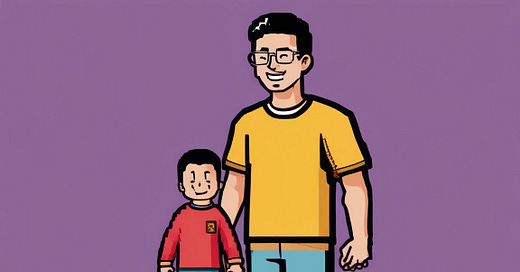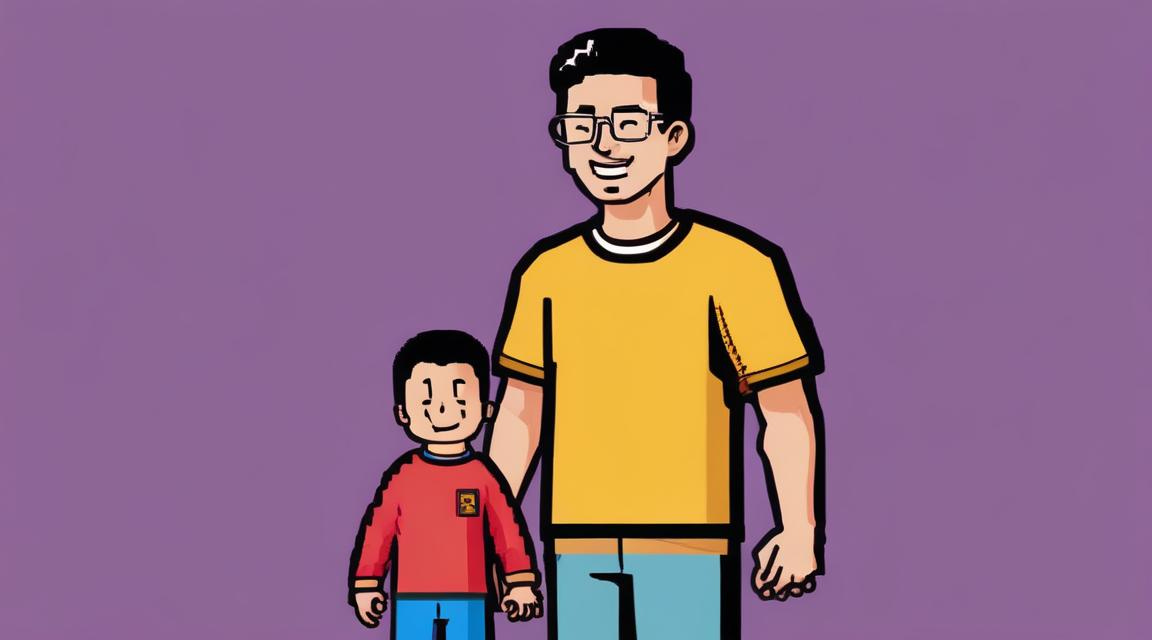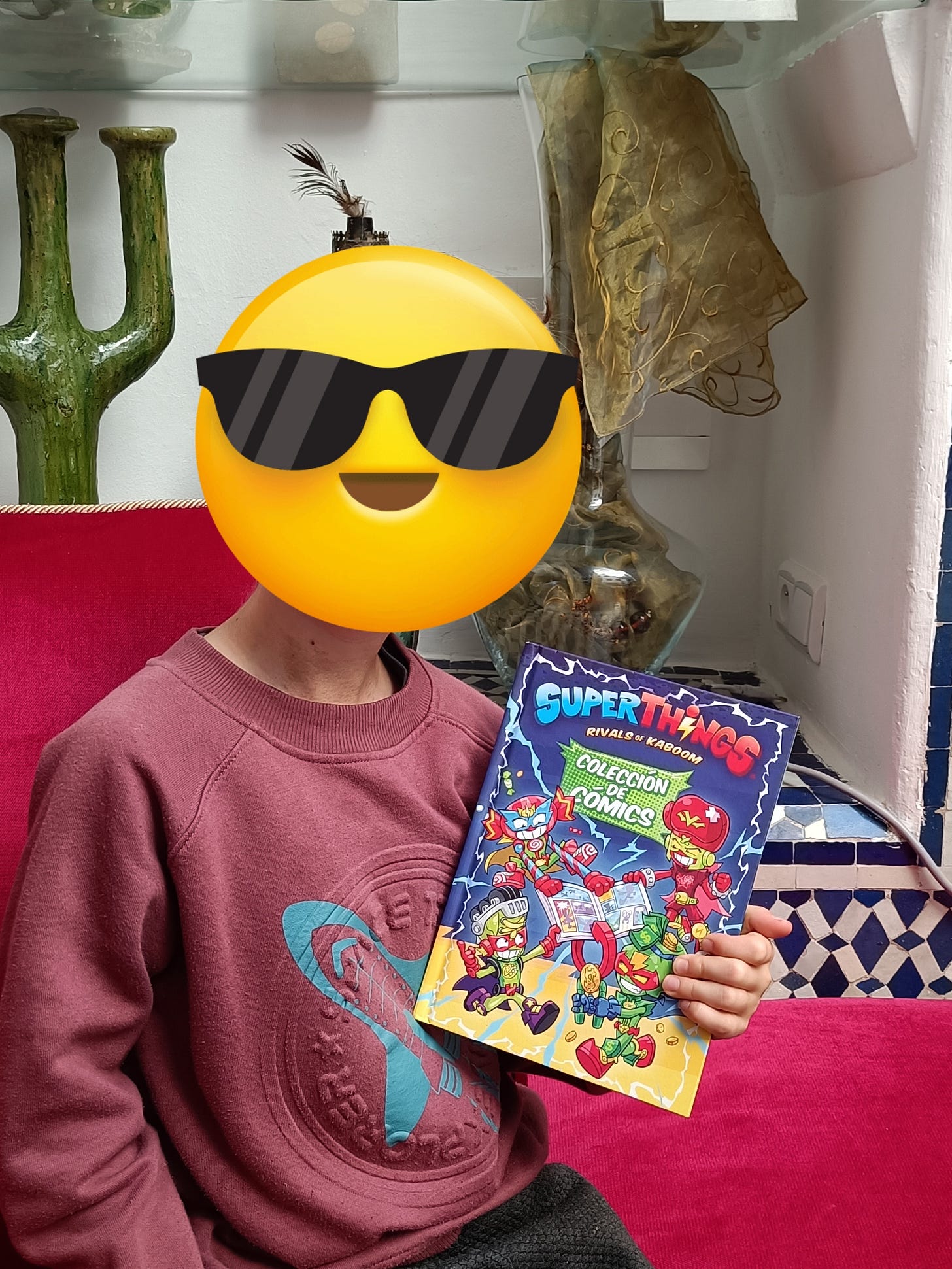Fatherhood Advice: An Honest Assessment and Areas of Improvement
What areas could you improve as a parent?
Welcome to the AFFathers newsletter on Substack.
I wanted to share this article with you today because I feel that my vulnerability can be of some help to dads in the early stages of fatherhood. Having navigated through the first seven years of my son’s life with varied success, I feel that I have enough experience and knowledge to share with you.
Before I continue, would you mind subscribing to Birth of Clarity?
Before the end of the year, I plan on making that the main home for my writing as I look to streamline the whole process.
I’m feeling a little raw this morning. Nothing in particular has caused this aside from the fact that I’m feeling my age. I am not a spring chicken anymore. And while I wouldn’t consider myself to be old, I have suddenly realised that I’m about halfway through my life - probably over halfway given the damage I did to my body through years of drug and alcohol abuse!
I look at my son every day and wish the best for him. I love him with all of my heart. That’s all I know. I don’t know how the future will turn out for him, but I know that while my heart is beating it will be full of love for him. And while I love him dearly, I know that I’ve not always been the best influence.
Again, I’m not sure why I’m writing this today, but I feel it is necessary to share what I’ve learned with other dads so they can avoid the same traps I’ve fallen into and better the achievements I’ve had. Whether I’m talking about addiction recovery, clarity and perspective or just my fatherhood journey, my aim is always to try to inspire others (mainly dads) with what I write. I know I’ve failed at this with some articles but hopefully, I won’t with this one.
Areas in need of improvement
The main point I want to address is the importance of leading by example. As a dad in addiction recovery, I know that I’ve got some of the basics covered BUT I’ve failed in other areas. The main ones being; negative microexpressions, overreactions and uncharacteristic tone of voice.
As soon as I wrote “microexpression” I thought of the show Lie to Me. Here’s a clip from the show:
When I say overreactions, I don’t mean going crazy for no reason. In fact, I don’t raise my voice too often. What I mean is, and I’ve said this before and still not rectified it, I huff and puff a lot. For example, if my son hasn’t picked up his toys despite having already been asked, I huff and puff and use exaggerated hand movements and facial expressions like it’s the end of the world! I roll my eyes or move my jaw as if I’m really agitated - which I’m usually not.
(As I edit this article, it’s become more and more obvious that these are behavioural traits I’ve picked up from my own father!)
Toxic combination
It’s the combination of the above that I’m talking about. It’s also the tone of voice I use to communicate my frustration with certain things. Instead of using my normal calm voice to ask my son again to pick up his toys (using the example above), I will use an almost antagonistic tone as if I want to start an argument. It’s a strange thing to write down but I need you to understand that despite all of the self-improvement work I’ve done over the years, I am susceptible to these crazy behaviours.
Hey, I might come off bad writing this. I don’t care. My aim is to highlight my flaws to help others. The reason I raise the above is because I often allow my external problems to affect my parenting. Even if the negative behaviour is in a brief moment, which is nearly always is - I’ve got better at catching my negative traits quickly - I know that they are counterproductive to the parent I want to be.
I wish I had spent more time working on this side of myself - the negative microexpressions, overreactions and uncharacteristic tone of voice - during his early childhood so it gone before his toddler years - when children are always watching, always listening, learning, studying, and mimicking behaviours.
They look up to you and if you’re screwing your face up in disgust at something trivial or throwing your arms up in the air when you’re angry at your football team losing, then they are going to do the same. Even when you’re not interacting with them directly, they are watching!
That argument you had with your partner, the one where you used a passive-aggressive tone, they were listening! They were using that information to form their own future actions.
When you smiled slightly at someone falling over on a YouTube video someone shared with you, they noticed and will no doubt replicate it.
You have to be mindful of your actions. You have to be mindful of your choice of words and tone of voice when communicating with others. You have to be mindful of your facial expressions.
When you get lost in your own head, you need to reset yourself properly before interacting with your children or with others in their presence. You need to be intentional and aware that your words, behaviours and actions are under the watchful eyes of your kids, who idolise and look up to you and want to be just like you.

Adventures
Parenting can be hard. However, in my case, I make it harder than it needs to be - as I’ve said before - but I’ve experienced some huge wins during this amazing journey.
Having recently travelled around Morocco with my son, I encouraged him to keep a diary of our adventures. We adopted a healthy routine of reading and writing. Both respecting each other’s quiet time and embracing the time we spent adventuring.
We’ve travelled a lot together and it’s in those times that we really vibe, as the cool kids say. It’s probably when I feel at my most relaxed - something that rubs off on him.
This is something I cannot stress enough; when you’re not relaxed then that comes across in your parenting. When you’re agitated and stressed, your children will replicate that energy.
Parenting calm makes for easier parenting.
I’m not sharing anything new or groundbreaking, I’m just sharing it from my experience. The times when I’ve experienced a huge leap in my parenting are when I’m not lost in my own head and approaching life from a calm and peaceful place.
When I chose to ditch the chaos of my drunken life and embrace the clarity of recovery, I missed a few areas that needed attention.
I was still drinking during the early years of my son’s life and when I quit, I had a blind spot for self-improving as a parent because I was so focused on improving as a newly sober man. But if I could go back, I would acknowledge that some behavioural changes were needed to be a sober dad.
Without alcohol, I had lost the crutch that had helped me through most of my life.
I’ve spoken previously about experiencing stress in recovery and also about dealing with the stress of fatherhood but I didn’t foresee some of the challenges I would have to face during those early years of sobriety. I wasn’t able to navigate them without adopting and maintaining some of the negative behavioural traits that lingered from years of alcohol abuse.
Related reading
Given the chance, I would eradicate these small, but negative, traits from my parenting/life in general and encourage you to do the same.
I don’t want my son to adopt these traits from me. I don’t want him to adopt my negative microexpressions, overreactions and uncharacteristic tone of voice, or be affected by them.
I want to lead by example, in all areas.
I want him to adopt my positive behavioural traits and ditch any negative ones he may have picked up from me.
I want his childhood to be fun, full of love and security. And while I know that I provide these, I acknowledge that I still have a lot of work to do.
As I draw to a close here, knowing that I’m a little all over the place (my apologies), I want to encourage you to share some areas of your parenting you want to improve, and how you will achieve it.
Are negative microexpressions a problem for you?
Do you often overreact to things?
Are you a “dramatic” parent?
Could you improve the tone of your voice in certain situations?
What positive practises have you put in place as a parent?
I’d love to hear from you.
Thank you for reading: “Fatherhood: An Honest Assessment to Help Other Dads.”
If you enjoyed this article and would like to support me, you can become a paid subscriber. If you’re unable to do so, I’d be very grateful if you’d ‘buy me a coffee’ - it will say Birth of Clarity so don’t be discouraged, I’m a stay-at-home dad and every little helps.
Before you go, here are some useful articles related to today’s post:
Check out the last post: “Navigating Sobriety: Practical Tips for Staying Strong Through Stress.”
Take care of yourself and your family,






Honest. Tough stuff. Thanks for sharing.